英语试题
注意事项:
1.本试卷分第Ⅰ卷和第Ⅱ卷两部分,第Ⅰ卷为选择题,45分;第Ⅱ卷为非选择题,55分;共100分。考试时间为120分钟(含听力20分钟)。
第Ⅰ卷 (选择题 共45分)
一、听力选择(共15小题,计15分)
(一)请听录音中八组短对话。每组对话后有一个小题,从A、B、C三个选项中,选出与对话内容相符的图片或能回答所给问题的最佳答案。(每组对话读两遍)
1. What kind of fruit does Lucy like better?
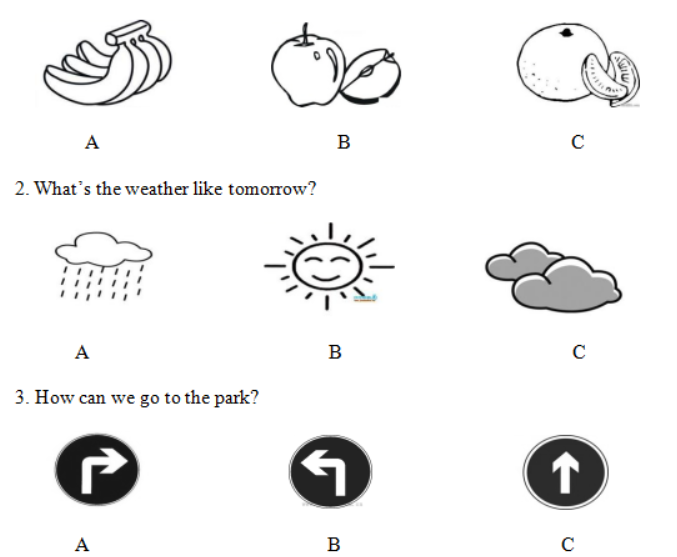
4. How much should the man pay?
A. 3 dollars. B. 8 dollars. C. 24 dollars.
5.What time does Bob get up today?
A. At 6:00 B. At 6:30 C. At 7:00
6. Where is the man?
A. On the street. B. At a restaurant. C. In a hospital.
7. Which sign will the man see?
A. No parking! B. No smoking! C. No taking photos.
8. How will the boy go to school today?
A. He will take the school bus.
B. He will go in his mother’s car.
C. He will go by bike.
(二)请听录音中两段较长的对话。每段对话后有几个小题,从题中所给的A、B、C三个选项中,选出一个能回答所给问题的最佳答案。(每段对话读两遍)
听第一段较长对话,回答第9至11三个小题。
9. What was Betty’s hobby when she was a child?
A. Singing. B. Reading. C. Drawing.
10. How often did she take her lessons?
A. Twice a month. B. Twice a week. C. Once a week.
11. When did Betty start to win prizes in some competitions?
A. When she was ten. B. When she was five. C. When she was fifteen.
听第二段较长对话,回答第12至第15四个小题:
12. Where is Frank now?
A. At home. B. At his grandma’s home. C. In Disneyland.
13. What is Grace doing?
A. He is checking my e-mail.
B. He is sending a photo to the computer.
C. He is taking a photo.
14. Did Grace go to Shanghai last weekend?
A. No, she didn’t. B. Yes, she did. C. Not mentioned.
15. What are the two speaker doing according to the conversation?
A. They are cooking at home.
B. They are communicating online.
C. They are taking photos.
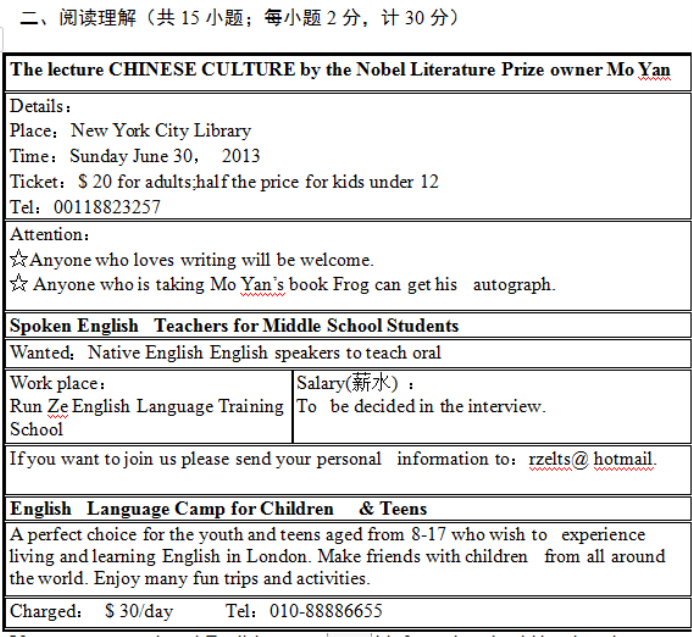
16. If you want to teach oral English, your personal information should be given by .
A. writing a letter B. sending an email
C. making a phone call D. giving a lecture
17. How much is a ticket of Mo Yan’s lecture for kids under 12? .
A. $10 B. $20 C. $30 D. for free
18. Which of the following is true about the three advertisements?
A. You can get Mo Yan’s autograph if you take his book Frog to the lecture.
B. You may want to be the oral English teacher because you can make more money.
C. The English Language Camp is a good choice for anybody who enjoys learning English.
D. Mo Yan’s lecture will be held on weekdays.
B
A young man entered the last interview of a company. The director found that the young man’s academic (学业的) grades were very good.
“Did you get any scholarships(奖学金)in school?” the director asked. “None,” the young man answered.
“Was it your father who paid for your school fees(学费)?” the director asked. “My father passed away when I was one year old, so it was my mother who paid for my school fees,” the young man answered.
“Where did your mother work?” the director asked. “My mother cleaned clothes,” the young man said. The director looked at the young man’s hands. He had a pair of smooth and perfect hands.
“Have you ever helped your mother wash the clothes before?” the director asked. “Never,” the young man answered. “I have a request,” the director said. “When you go back today, go and clean your mother’s hands, and then see me tomorrow morning.”
The young man felt that his chance of getting the job was high. When he went back, he happily asked his mother to let him clean her hands. His mother felt strange; happy but with mixed feelings. She showed her hands to the kid. The young man cleaned his mother’s hands slowly. His tears fell as he did that. It was the first time he had noticed that his mother’s hands were so wrinkled (皱褶的).He realized it was this pair of hands that helped him pay the fees.
The next morning, the young man went to the director’s office. “I cleaned my mother’s hands, and I know that without my mother. I would not be the person I am today,” he said.
“This is what I am looking for in my manager,” the director said. “I want a person who can appreciate(感激) the help of others to get things done. You are hired.”
19. What did the director ask the young man to do?
A. To write a thank-you card to his mother. B. To wash his mother’s hands.
C. To help his mother do housework. D. To clean the company’s floor.
20. How did the young man’s mother feel when he washed her hands?
A. She felt surprised. B. She had mixed feelings.
C. She felt sad. D. She was filled with happiness.
21. The director hired the young man because ________.
A. he cleaned his mother’s hands
B. he had good academic grades
C. he could appreciate others’ help
D. he knew how to thank his mother
22. What does the writer mainly want to tell us?
A. We should have working ability.
B. We should get good academic grades.
C. We should improve communication skills.
D. We should appreciate
C
Zhang Ming. a college graduate from Shandong,created a 9-page“WeChat guide” (微信指南) to parents. With drawings and simple words,the step-by-step guide explains how to send messages,take pictures and make video calls. “My parents are getting old. They need an easy way to learn how to use technology,”Zhang said.
Zhang’s experience is common nowadays. In the world,40%of parents learn about new technology,including computers, mobile Internet and social media(社交媒体),from their children,according to a survey from the International Communication Association. Parents teach their kids almost everything when they are young. Now for the first time, the teachers become the students and the students become the teachers.
The change of roles comes from the rapid development of society and technology,according to ZhouXiaohong,a professor from Nanjing University.Zhou said the Internet and other forms of media give children more ways to get information. So,it’s possible that children know more than their parents do these days.
According to the China Internet Network Information Center,in China,56.7%of Internet users and 67.2%of social media users are under the age of 30. Young people usually act as a link between their family and the new environment. But when they teach their parents new technologies,parents can connect to the new world by themselves.
In Zhang Ming’s eyes,teaching his parents about WeChat brings him closer to his parents. “People can communicate more by using new technology. Why should we keep our parents out?”said Zhang.
23. From the first paragraph we learn that“We Chat guide” .
A. is created by Zhang Ming’s parents
B. has 19 pages
C. explains how to send messages,take pictures and make video calls
D. has only pictures in it
24. What does the underlined word“they”refer to?
A. Parents. B. Kids. C. Teachers. D. Students.
25. What does the underlined word“link”mean?
A. 权利 B. 典范 C. 素材 D. 纽带
26. From the passage we can infer (推断) that .
A. most parents learn about new technology all over the world
B. young people can be their parents’ teachers in the age of new technology
C. ZhangMing created“WeChat guide”in order to become famous
D. old people needn’t to learn new technology

D. six big desks were moved into Fan Xing’s classroom.
28. What’s the purpose of the new classroom arrangement? .
A. Make the students feel fresh and interested.
B. Divide big classes into small classes.
C. Make more room for new students.
D. Provide students with more chances for teamwork.
29. Which of the following is NOT true according to the passage?
A. The students in Changsha Daotian Middle School are sitting in groups when having classes.
B. The reform in the school is aimed at improving the students’ abilities for self-study.
C. Studying in groups gives the students more confidence to concentrate on class.
D. The new classroom arrangement also brings some new challenges to the teachers.
30. What’s the best title for the whole text?
A. Students’ Friendship B. Teachers’ Hope
C. Discussion in Class D. New Classroom Arrangement
第Ⅱ卷(非选择题,共55分)
三、听力填词(共5小题,计5分)
请听下面一段独白,根据所听到的内容,写出可以填入下表1-5空格处的适当单词,每空限填一词。(独白读两遍)(计5分)
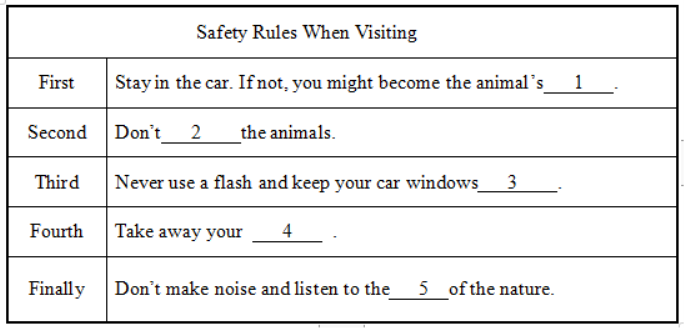
四、单词拼写与运用(共8小题,计8分)。
根据句意完成已给首字母或汉语提示的单词,使补全后的句子意思通顺,语法正确。
1. Wednesday is the f day of a week.
2. It’s too cold today so I’ll stay at home i of going out.
3. Do you know the differences b the twins?
4. It takes me twenty m to walk to school.
5. We are looking forward to using free wi-fi (到处)in the near future.
6. After school , the kids said goodbye to the teacher (礼貌)
7. The boy is (勇敢的) enough to save the little girl from the river.
8. This article tells us how to (避免) getting hurt while climbing.
五、语法填空。(共10小题,计10分)
阅读下面短文,再空白处填入一个恰当的单词或括号内单词的正确形式。
A
I was feeling a little sad because my mother had lost her job. One day, while I was walking on the street, I heard that a beautiful piece of piano music 1 (play) above the noise of the people. I walked more slowly to find out where it was coming from. Then I saw a young lady 2 (sit)at a piano.
She was singing songs about love, believing yourself and keeping on 3 (try). I stood there 4 (quiet), watching her playing on such a crowded New York square. She noticed me. I walked over and told her how good her music sounded.
“Well, my mom lost her job, and I'm not sure what to do ...”
“ Did you notice the way you were walking? Your head was down.” she said. “ 5 (not be) upset, because opportunity comes in different ways and if your head is down, you might not see it. You should smile more ... lift your head up.”
I smiled a little wilder, realizing that no difficulties could stop me from going on.
B
Dear Peter,
I can’t believe I’m here at last!
Australia is great. We 6 (arrive) in Sydney nearly two weeks ago. Sydney, with its beautiful Opera House, is the 7 (large) city of Australia. We went to the Opera House 8 boat and I saw my first koala bears there.
I’m in Melbourne now. It’s much smaller than London, but it’s also cleaner and quieter. We live in Uncle Tong‟s house. His 9 (friend), Mr. and Mrs.Cheng, are from Hong Kong. They cooked us a great meal and we enjoyed it very much.
I 10 (be)here for a few days.You know what its ingredients are? Could you please tell me when you write to me?
Best wishes, Bernard

It was a cold afternoon. Mom asked me to go to buy some milk. I asked Dad if I
1 use his car. I just got my driver’s license. I thought it was a good chance for me to practice by myself. Dad loved his car and 2 allowed me to drive his car before. But after practicing for three months, I 3 wanted to have a try. Dad looked at me and finally agreed to let me use his car. I got into the car happily and started it. However, I was a little scared about 4 the car on my own and started it too quickly. The car hit my mother’s car! My family heard the loud 5 and everyone ran outside. I got out of the car and looked at Dad.
I was really worried. I knew he loved his car very much. I 6 there. Just when I expected him to shout 7 me, he said quietly, “It’s OK, Jenny. As you can see, I love the car, but I love you much more.” On that day, I learned how much Dad loved me.
七、任务型阅读。阅读下面短文,根据短文内容,完成下列各题。
(共5小题;每小题,计10分)
Many famous people had dreams when they were young. They often worked hard to make their dreams come true. When I was only 13 years old, I first thought about what I should do in the future. I used to dream about being a basketball player, a soccer player, or a baseball player. However, I gave up these dreams because I was too short. Then I thought about going into music, so I bought a guitar. But I couldn’t play it very well. Then I had to give up my dream again. After that I thought about being a reporter and I worked really hard at it. At the age of 25, my dream came true and I became a reporter Finally, I learned the truth about making dreams come true. I should never give up and I must work hard.
1. How old was the writer when he first had a dream? (no more 5 words)
2. Why did he give up being a basketball player? (no more 5words)
3. Did his dream come true at last?(no more than 3words)
4. 翻译文中划线的句子
5. 给短文拟一个合适的标题
八、作文(15分)
假如你是 Li lei,请你结合自己对三年初中生活与学习的感悟,要求:
1. 语句通顺,时态正确,符合逻辑。
2. 字数 70 个左右(开头已给出, 不计入总词数)。内容要点如下:
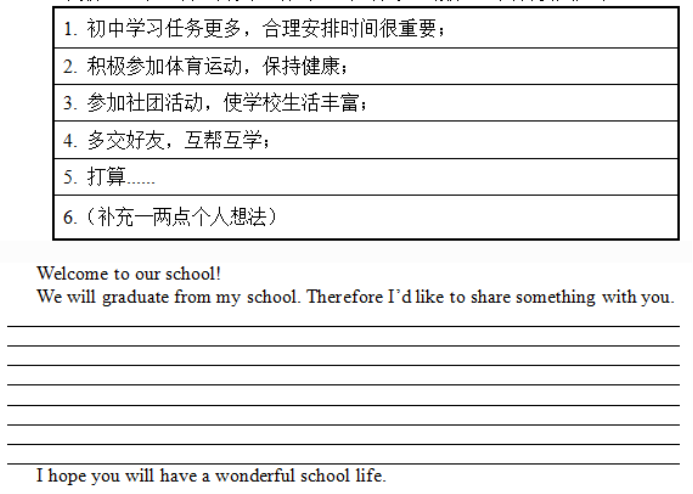
九年级英语试题参考答案
第I卷(选择题 共45分
一、听力选择(共15小题,计15分)
1-5 ABACC 6-10 CCBAB 11-15 CABBB
二、阅读理解(共15小题;每小题2分,计30分)
16-20 BAABB 21-25 CDCBD 26-30 BADCD
评分说明:
1. 第I卷为选择题,共计45分。
2. 1-15小题,每小题1分,计15分;16-30小题,每小题2分,计30分。
第Ⅱ卷(非选择题,共55分)
三、听力填词(共5小题,计5分)
1. food 2. feed 3. closed 4. rubbish 5. sounds
评分说明:本题共计5分,每小题1分。
四、单词拼写与运用(共8小题,计8分)。
1. fourth 2. instead 3. between 4. minutes
5. everywhere 6. politely 7. brave 8. avoid
评分说明:
1.本题共计8分,每小题1分。
2.虽与答案不符,但只要单词拼写正确,句意和语法皆无错误,也可给分。
3.若有拼写错误,该词不给分。
4.若写了两种以上(含两种)的形式,即使其中一种是对的,也不给分。
五、语法填空。(共10小题,计10分)
1. was played 2. sitting 3. trying 4. quietly 5. Don’t be
6. arrived 7. largest 8. by 9. friends 10. have been
评分说明:本题共计10分,每小题1分。
六、完型填空(共7小题;每小题1分,满分7分)
1. could 2. never 3. really 4. driving
5. noise 6. stood 7. at
评分说明:本题共计7分,每小题1分。
七、任务型阅读。(共5小题;每小题分,计10分)
1. He was 13 years old..
2. Because he was too short.
3. Yes, it did./Yes
4. 他们经常努力工作去实现他们的梦想。
5. Never give up your dream(意思贴近即可)
评分说明:
1.本题共计10分,每小题2分。
2.1-3小题:能回答所给问题,且无语法错误,均可给2分。
3. 第4小题:意思正确,语句通顺,可给2分;虽意思正确,但表达不符合汉语习惯,可给1分。
4. 第5小题:能全面概括主旨大意,虽与答案不完全一致,也可给2分;所写题目只涵盖了部分主旨大意,可给1分。
八、作文(15分)
Welcome to our school!
We will graduate from my school. Therefore I’d like to share something with you. Firstly , it is important for you to make full use of time since you will get many more subjects in the middle school. Secondly, try to keep balance between school life and study. You must do more exercise to keep healthy. What’s more, you can join some clubs to make school life more colorful in your spare time. In this way, you can also make more friends. As we all know, a true friend reaches for your hand and touches your heart. So you should learn and help each other. At last, if you meet problems in your school life, try to talk with your teachers or parents. They are always there for you.I want to go to senior high school.I hope my dream will come true.
I hope all of you will have a wonderful middle school life.
评分说明:评分时,可根据内容和语言表达等方面分为四个档次:
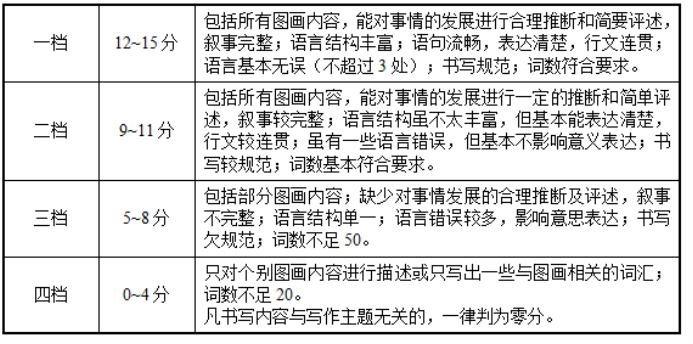

2024山东高中最新排名:山东省青岛第二中学、东营市胜利第一中学、济南市历城第二中学、东营市第一中学、日照第一中学、淄博实验中学、烟台第一中...

2024年山东中小学寒假开学时间:2024年聊城中小学寒假开学时间:放到2月25日,2月26日正式上课。2024年日照中小学寒假开学时间:2...
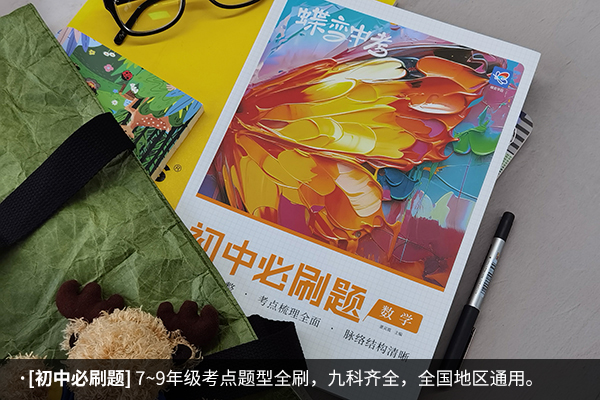
山东初中教辅资料:蝶变初中数学必刷题、点拨、教材完全解读、轻松夺冠、零失误全面讲解、北大绿卡、典中点、课课练、初中夺冠单元检测卷、黄冈密卷、...
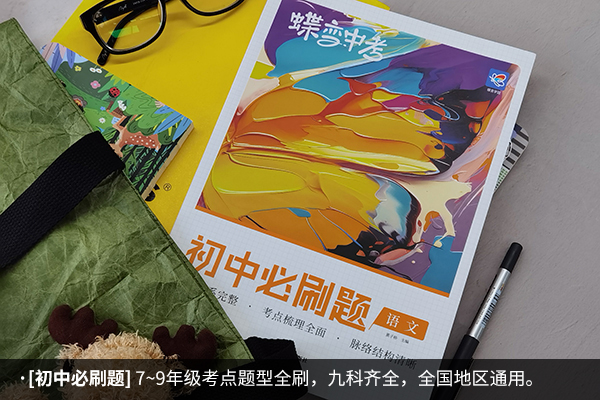
山东中考资料:蝶变中考语文必刷题、5年中考3年模拟、万唯中考试题研究、一本涂书、知识清单、语文基础知识手册、学霸笔记、金考卷、天利38套、万...
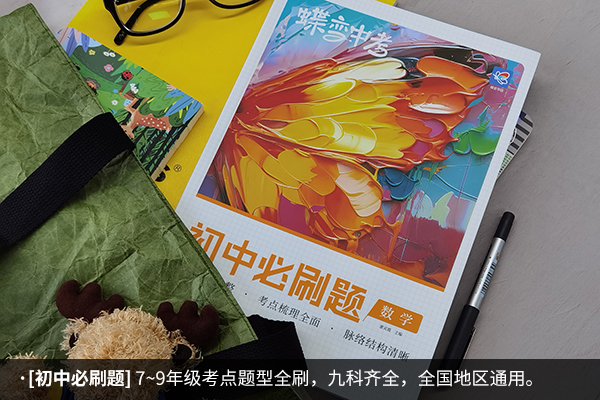
山东中考买的资料:蝶变中考数学必刷题、启东作业本,学习探究诊断,数学探究应用新思维,5年中考,3年模拟。初中语文可以选择启动作业本,5年中考...
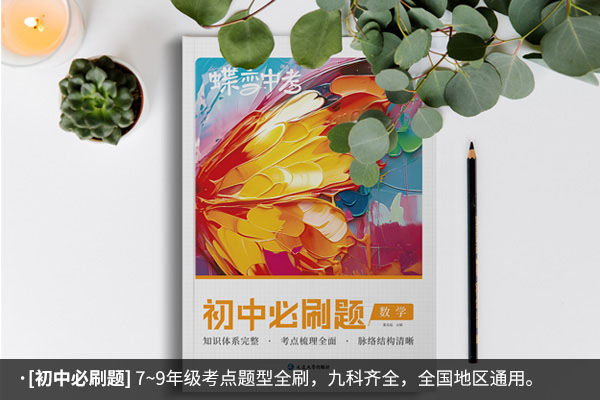
山东中考刷题资料:蝶变中考数学必刷题、培优新方法、教材帮、中考词汇闪过、发散思维大课堂、中考英语四轮复习、双色笔记、重高、新教材完全解读、5...
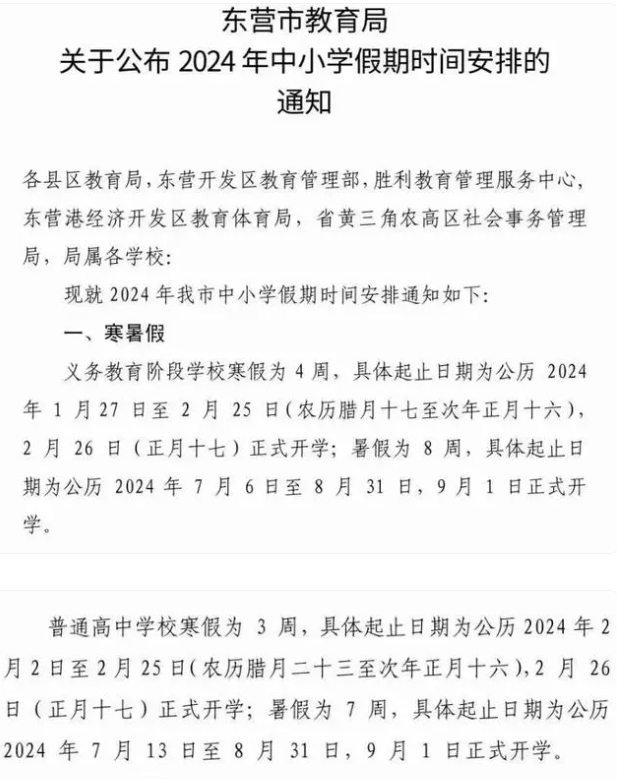
截至2023年12月15日,山东各市均已明确2024年各阶段学校寒假时间安排。从各地公开发布的校历来看,义务教育阶段学校寒假一般从1月底开始...
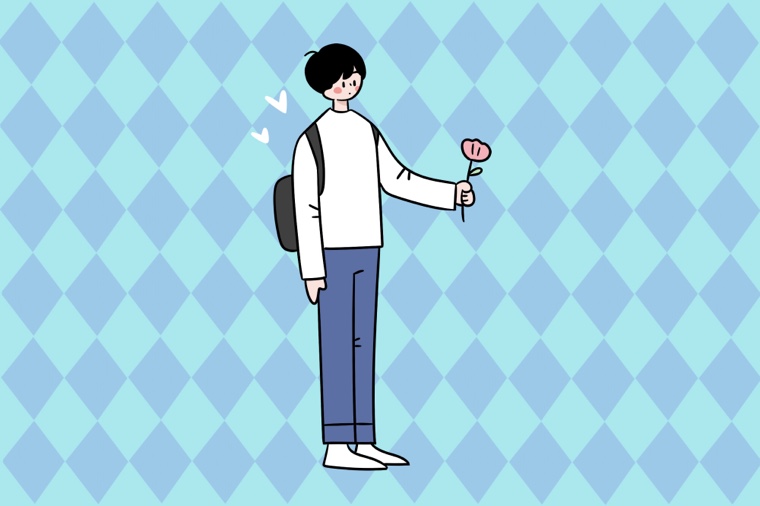
长清区职业中等专业学校是山东适合初中生上的公办职业学校之一。它位于长清城南三公里,经过莱芜机械工程职业中等专业学校的设置,该学校有着良好的教...